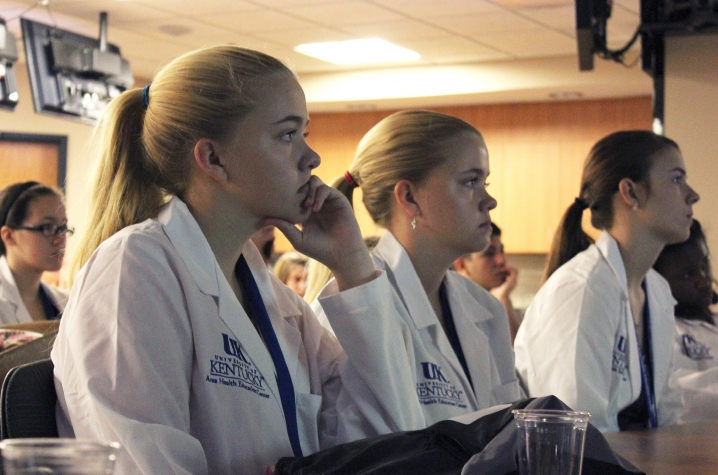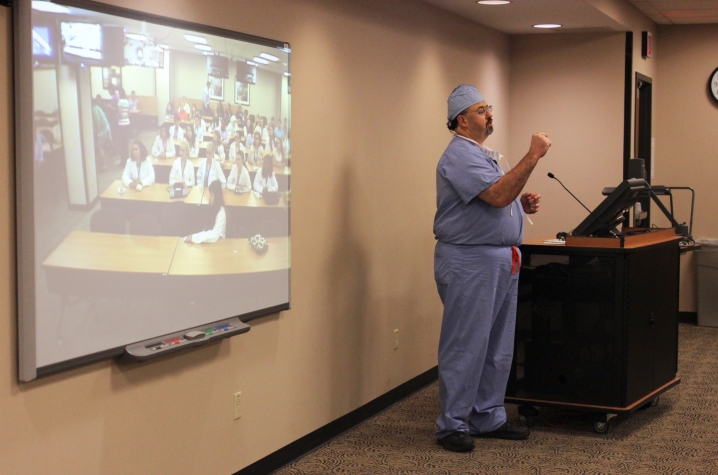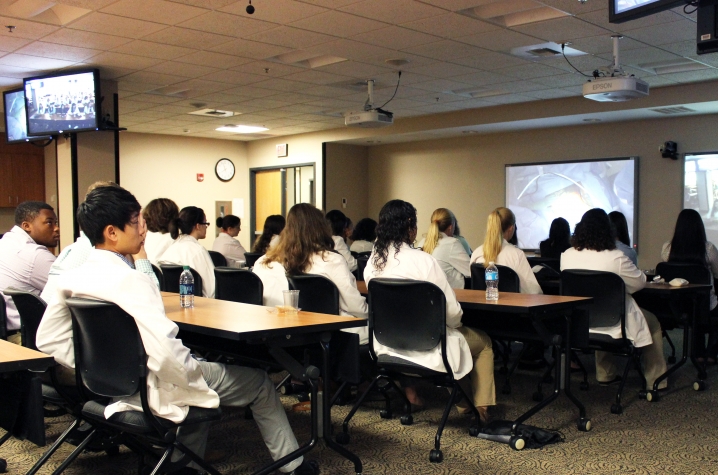UK College of Medicine Lecture Exposes High School Students to Real-Life Surgery
LEXINGTON, Ky. (July 2, 2014) -- The first surgical lesson a group of high school juniors in white lab coats learned from Dr. Joseph Iocono at 7:30 a.m. on a Tuesday was the importance of adapting to the case circumstances.
Streaming a live surgery to flat-screen televisions in the multipurpose room at the University of Kentucky College of Medicine, Iocono gave 26 campers part of the Area Health Educational Center Summer Enrichment Program and about 75 additional guests a first look inside the operating room. The live surgery narrated by Iocono, a pediatric surgeon at Kentucky Children's Hospital and associate professor of surgery at UK, was also live-streamed to satellite classrooms in Hazard, Western Kentucky University in Bowling Green and Covington. With late changes to the schedule at the UK Chandler Hospital, Iocono scrapped the original plan to narrate the removal of a gall bladder and instead guided students through a feeding tube insertion procedure performed by fellow surgeon Dr. John Draus.
"Have you had breakfast?" Iocono, wearing a white mask and blue scrubs, said from the bottom of the screen. "Before we start showing you the insides of abdomens, we want to make sure you all ate."
In the background, an eight-member surgical team circled and prepped a sedated pediatric patient on the operating table. Iocono provided a briefing on the case of this patient, who suffered a traumatic brain injury after being involved in a car crash. Because of his brain injury, the patient needed support with feeding. The medical team's next step was placing a semi-permanent feeding tube to ensure the patient received regular nutrition through his recovery.
With a laparoscopic camera view inside the patient's body and an additional overhead camera view of the surgical team, students received an internal and external view of what Iocono called a "straight-forward" operation. In lecture-style format, Iocono explained each step taken by his colleague.
He discussed the preliminary measures of prepping and draping the patient to create a sterile field for surgery and the importance of monitoring vital signs throughout surgery. Once incisions were made and the laparoscopic camera inserted into the abdomen of the patient, Iocono identified internal organs in view and described the surgeon's technique of attaching the stomach to the abdomen, and then inserting the feeding tube. He accepted questions from students throughout the 45-minute surgery, which ranged from "Does the patient's age make surgery more difficult?" to "How did you learn to stitch?"
At the conclusion of the live surgery, Iocono addressed the students in-person at the multipurpose room in the College of Medicine. He also talked about his long road to becoming a surgeon and other opportunities to work in health care, noting that at least 25 different health care professions were represented in care of the patient they had observed that morning. Many students were also interested in knowing more about the patient's injuries and prognosis.
The Area Health Education Center (AHEC) Summer Enrichment program is a preparatory camp for high school sophomores interested in careers in health care. Only 26 students out of more than 200 applicants were selected for the four-week camp, which includes scientific lectures, laboratory work, clinical observations, shadowing sessions and tours of health care facilities around the state. Others participating in the surgery broadcast included students from two regional AHEC summer camps, students from the Freshman Summer Program and a number of undergraduate students from UK and regional universities all interested in pursing a health profession.
An AHEC camper from Boone County, Jayleigh Tanabe said she was a little intimidated by the procedure, but also excited. She wants to become a pediatric surgeon because she loves children and enjoys visiting her own pediatrician. She was impressed by the surgeon's skills using tools to stitch the inside of the child's abdomen.
"He does it all the time - like getting dressed in the morning," she said of the surgeon.
AHEC camper Montana Sexton required orthopedic surgery as a child so she could continue playing volleyball. Sexton, who is from Letcher County, had to travel four to five hours to receive treatment and therapy after her surgery. She said she hopes to become an orthopedic surgeon and one day bring her skills back to her hometown. Watching the surgery at the AHEC camp gave her confidence to pursue that dream. The next day, as part of her camp experience, she was able to spend the entire morning in the operating room with Iocono’s surgical team.
"There's a lot to learn, but I think I'll be able to do it," she said.
MEDIA CONTACT: Elizabeth Adams; elizabethadams@uky.edu







